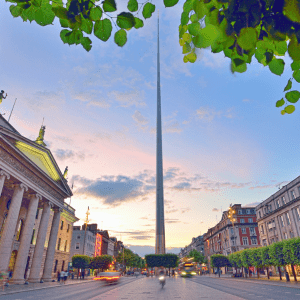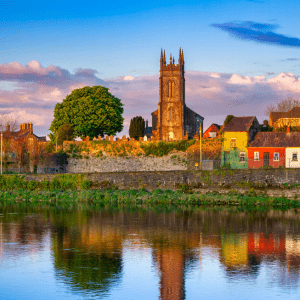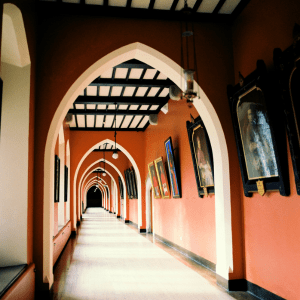# let's Grow Your Hand
Study in the Ireland Your Roadmap to Success!
Navigate Your Path to Success - Expert Guidance for Studying Abroad in the Land of Opportunities!
Why Study in Ireland?
Ireland consistently ranks high in global education indices, ensuring that students receive top-notch education and exposure to a multicultural society. The emphasis on innovation and technological advancement makes German institutions leaders in various fields.
Academic Excellence
Benefit from world-renowned universities and cutting-edge research, ensuring a top-tier education that opens doors globally.
Diverse Culture
Immerse yourself in a melting pot of cultures, ideas, and perspectives, fostering personal growth and a truly enriching experience.
Career Opportunities
Gain access to a dynamic job market with ample internship and post-graduation employment opportunities, setting the stage for a successful career.
Innovation Hub
Join a country at the forefront of innovation and technology, offering a stimulating environment for creativity and entrepreneurial pursuits.
Quality of Life
Experience a high standard of living, excellent healthcare, and a variety of recreational activities, making the Ireland a well-rounded and desirable destination for international students.
The Transformative Benefits of Choosing to Study
Discover the world, expand your mind! Choose to study abroad for top-notch education, cultural immersion, and personal growth. Your journey to global success starts here!
Choose Your Desired Courses
Discover the world, expand your mind! Choose to study abroad for top-notch education, cultural immersion, and personal growth. Your journey to global success starts here!
Choose Your Interested Location in Ireland
Discover academic excellence amidst stunning landscapes. Study in Ireland for a vibrant cultural experience, renowned universities, and opportunities in tech and entertainment industries.



Dublin
- Phone:+1 (859) 254-6589
- Email:info@example.com



Limerick
- Phone:+1 (859) 254-6589
- Email:info@example.com



Maynooth
- Phone:+1 (859) 254-6589
- Email:info@example.com
Admission requirements for studying in Ireland
Planning to study in Ireland
? Let us help you get started with the basic admission requirements that you will need.
Preparing for Examinations
Pursuing a course in the Ireland begins with competitive and rigorous exams such as GRE/GMAT for postgraduate studies and IELTS or TOEFL for English proficiency. Some programs do not require GRE/GMAT. Thorough preparation is vital as these exams significantly influence university admissions.
University Application Process
The application process involves submitting academic transcripts, letters of recommendation, a statement of purpose, and exam scores. Meeting application deadlines and following specific university guidelines are critical to success.
Figuring Out Your Finances
A full-time program in the US can cost up to ₹ 70Lacs. Planning your finances is essential, considering options like scholarships and loans, though the latter may come with high-interest rates.
Visa Process
Applying for a student visa entails presenting the necessary documentation, attending an interview, and paying a fee. It is advisable to start this process early to avoid delays.
Booking Your Travel
Early travel bookings are recommended, as costs can be high, especially during peak seasons. Consider budget airlines and travel packages to minimize expenses.
Finalizing Your Stay
The cost of accommodation varies based on location and preferences. Exploring housing options early allows for a more budget-friendly selection, whether choosing university housing or private rentals.
How You Can Manage expenses while studying in the Ireland
Our programs offer financial aid and the chance to study in Ireland at low cost. Here's how international students in Ireland manage their living expenses while studying there.
Opting for hybrid programs, which combine online and in-person classes, can offer significant cost savings. These programs allow students to complete a portion of their coursework remotely, reducing expenses associated with accommodation, transportation, and on-campus living.
The flexibility of hybrid programs enables students to strike a balance between academic pursuits and managing their budget effectively.
Ireland is home to numerous institutions and organizations that offer a wide range of scholarships for international students. These scholarships can cover tuition fees, living expenses, or a combination of both. It is crucial for students to research and apply for available scholarships well in advance.
Many academic institutions and governmental bodies provide financial aid based on merit, need, or specific criteria related to the student’s field of study. Applying for scholarships can significantly alleviate the financial strain of studying abroad.
Taking out student loans is a common method for funding education in Ireland. Financial institutions, both in Ireland and in the student’s home country, often provide loans specifically tailored for international students. Before opting for a loan, it is essential to thoroughly understand the terms and conditions, interest rates, and repayment plans.
Students should explore government-sponsored loan programs and private financial institutions to identify the most suitable loan options that align with their financial capacity.
Ireland allows international students to work part-time during their studies. Engaging in part-time employment not only provides students with valuable work experience but also contributes to covering living expenses. Most students work in sectors such as retail, hospitality, or on-campus roles.
It is important, however, to strike a balance between work and academics, ensuring that employment commitments do not compromise the quality of education.


























Everything You Need To Know About Ireland
Welcome to the captivating country of Ireland! Located on the western fringes of Europe, this island nation is known for its breathtaking landscapes, rich history, and warm hospitality. From rolling green hills to rugged coastlines dotted with dramatic cliffs, Ireland's natural beauty never fails to impress.
Steeped in ancient mythology and folklore, Ireland boasts a vibrant cultural heritage that is still celebrated today. Traditional music sessions can be found in pubs throughout the country, where talented musicians play lively jigs and reels that will have you tapping your feet in no time. And speaking of pubs, don't forget to try some authentic Irish cuisine like hearty stews and freshly caught seafood!
History buffs will be delighted by Ireland's fascinating past. From ancient Celtic tribes to Viking invasions and English colonization, each chapter has left its mark on the country's architecture and landmarks. Be sure to explore iconic sites such as Dublin Castle or venture westward to discover the mystical ruins of Glendalough.
But it's not just about history and stunning vistas here - modern-day Ireland also offers a thriving arts scene with world-class museums, galleries, theaters, and festivals showcasing local talent across various disciplines. Whether you're into literature or contemporary art installations, there's always something inspiring happening around every corner.
So pack your bags (and an umbrella - it can get rainy!) because Ireland awaits with open arms ready to enchant you with its charm and leave you yearning for more adventures amidst its magical landscapes. Let's embark on this journey together as we explore everything this incredible destination has to offer!
Ireland's history is rich and fascinating, spanning thousands of years. From ancient Celtic tribes to Viking invasions and English colonization, the country has seen its fair share of tumultuous times.
The earliest evidence of human habitation in Ireland dates back to around 10,500 BC, with the arrival of Mesolithic hunter-gatherers. Over time, these early settlers developed a distinct culture and way of life.
In the fifth century AD, Christianity was brought to Ireland by Saint Patrick. This marked a significant turning point in Irish history as it shaped the country's religious beliefs and cultural identity for centuries to come.
Throughout the medieval period, Ireland experienced waves of Viking raids and settlements along its coasts. These Norse invaders traded with locals but also engaged in conflict and conquest.
In the 12th century, English influence began to grow stronger with King Henry II claiming authority over Ireland. This led to centuries of English control and attempts at assimilation into their empire.
The Great Famine in the mid-19th century had a devastating impact on Ireland's population. The failure of potato crops resulted in mass starvation and forced many people to emigrate from their homeland.
The struggle for independence intensified throughout the late 19th and early 20th centuries. The Easter Rising in 1916 marked a pivotal moment in Irish history as it sparked widespread support for an independent Ireland.
Finally achieving independence from Britain in 1922 after a bloody war for freedom, modern-day Ireland emerged as an independent nation known as Éire or The Republic of Ireland while Northern Ireland remained part of the United Kingdom.
As you can see, Irish history is complex yet captivating. It has shaped not only the country itself but also influenced Irish culture worldwide. Understanding this historical backdrop helps us appreciate all that makes up modern-day Ireland.
Ireland's economy is known for its resilience and growth. Over the years, it has transformed into a modern and diversified market economy. The country has come a long way from being primarily agricultural to becoming one of Europe's leading hubs for technology, pharmaceuticals, finance, and other sectors.
One of Ireland's key strengths lies in its openness to foreign investment. Many multinational corporations have chosen Ireland as their European headquarters due to its favorable business environment and skilled workforce. This has significantly contributed to the country's economic success.
The financial crisis of 2008 had a profound impact on Ireland, causing a recession that led to high unemployment rates and budget deficits. However, through careful planning and government intervention, the economy rebounded strongly in subsequent years.
Today, Ireland boasts low corporate tax rates which continue to attract international companies seeking favorable taxation policies. Additionally, initiatives such as Research & Development grants promote innovation and entrepreneurship within the country.
Despite challenges posed by Brexit and global uncertainties like COVID-19 pandemic disruptions, Ireland remains resilient. It continues to foster economic growth through investments in infrastructure development projects while also prioritizing sustainability goals.
Ireland’s economy has evolved over time into a dynamic mix of industries driven by foreign investment and innovation-led growth strategies. Its adaptability amidst changing global circumstances positions it well for continued success in the future.
Ireland is home to a vibrant and diverse population, with approximately 4.9 million people calling the country their home. The population of Ireland has been steadily increasing in recent years, thanks to a combination of natural growth and immigration.
The majority of the population resides in urban areas, with Dublin being the most populous city in the country. However, there are also many beautiful rural areas that are sparsely populated but offer stunning landscapes and a peaceful way of life.
It's worth noting that Ireland has experienced significant emigration throughout its history, particularly during times of economic hardship. This has resulted in large Irish diaspora communities around the world, particularly in countries such as the United States and Australia.
The population of Ireland is known for its warmth and friendliness towards visitors. The Irish are renowned for their hospitality and welcoming nature, making it an enjoyable place to visit or live.
While Ireland may have a relatively small population compared to other countries, it is full of character and charm that makes it an attractive destination for people from all walks of life. Whether you're exploring bustling cities or tranquil countryside, you're sure to encounter friendly faces along the way.
The population of Ireland was approximately seven million in 2021, with 1,903,100 in Northern Ireland and 5,123,536 in the Republic of Ireland.
The population of the Republic of Ireland exceeded five million for the first time in the 2022 census. In 2016, the population was approximately 6.6 million, with 4.75 million in the Republic of Ireland.
The population of Ireland remains below the record high of 8,175,124 in the 1841 census. The population experienced rapid growth, rising from less than three million in 1700 to over eight million by the 1841 census.
The population declined to 6.5 million by 1851 due to the Great Famine and the resulting Irish diaspora. The population increased by almost 1.9 million over the past 60 years, rising from 2,898,264 in 1956 to 4,761,865 in 2016.
In 2023, the estimated population of Ireland was 5,203,000
Ireland is a country that boasts a rich and vibrant culture, shaped by its ancient Celtic roots as well as its more recent history. The Irish people are known for their warm hospitality and love of storytelling, music, and dance.
One aspect of Irish culture that stands out is the traditional music. From lively jigs to soulful ballads, Irish music has a way of capturing the spirit of the nation. It's not uncommon to stumble upon impromptu sessions in pubs or vibrant festivals celebrating this cherished art form.
The Irish also have a deep connection with literature. Many renowned writers such as James Joyce, Oscar Wilde, and W.
B. Yeats hail from Ireland. The literary tradition is still alive today with numerous book festivals and literary events taking place throughout the year.
In terms of lifestyle, Ireland offers a balanced mix of urban excitement and natural beauty. Cities like Dublin offer bustling nightlife scenes with trendy bars, restaurants, and clubs while also being home to historic landmarks like Trinity College or St Patrick's Cathedral.
Outside the cities lies an enchanting landscape dotted with castles, ancient ruins, lush green fields, breathtaking cliffs (such as the famous Cliffs of Moher), and picturesque coastal villages.
The Irish are known for their fondness for outdoor activities like hiking along scenic trails or engaging in water sports along the rugged coastline. This love for nature is deeply ingrained in their lifestyle - weekends often involve exploring stunning landscapes or enjoying family picnics in parks.
Ireland's strong sense of community can be seen through its close-knit neighborhoods where people come together during local events such as festivals or sporting matches – especially when it comes to Gaelic games like hurling or football.
Ireland’s culture is diverse yet united by shared values such as community spirit, artistic expression,and appreciation for nature.
The charm,is evident everywhere you go,making it an inviting destinationfor those seeking adventure,cultural experiences,and warm-hearted people.
Ireland is a stunning country located in the westernmost part of Europe. It is an island that forms a part of the British Isles and is surrounded by the Atlantic Ocean, the Celtic Sea, and the Irish Sea. The island itself is divided into two parts - Northern Ireland, which is a part of the United Kingdom, and the Republic of Ireland.
The geography of Ireland offers diverse landscapes ranging from beautiful coastlines to rolling hills and lush green fields. The west coast boasts rugged cliffs such as those found at the famous Cliffs of Moher, while in contrast, you can find serene lakes like Lough Neagh in Northern Ireland.
In terms of size, Ireland covers approximately 84,421 square kilometers (32,595 square miles), making it slightly larger than West Virginia. Its longest river is River Shannon which stretches over 360 kilometers (224 miles). Additionally, there are several other rivers throughout the country that add to its picturesque beauty.
One notable geographical feature in Ireland is its abundance of peat bogs. These wetlands are unique ecosystems formed over thousands of years and provide essential habitats for various plant species as well as being rich sources for fuel.
Exploring Ireland's geography will lead you to discover breathtaking landscapes and natural wonders that leave visitors awe-struck. So whether you're hiking along cliff edges or strolling through peaceful countryside villages – be prepared to immerse yourself in nature's beauty!
Ireland is known for its temperate maritime climate, which means that it experiences mild winters and cool summers. The country's location on the western edge of Europe influences its weather patterns, with the Atlantic Ocean playing a significant role.
The weather in Ireland can be quite changeable from day to day, and even within a single day. It is not uncommon to experience rain, sunshine, wind, and clouds all in one day! This variability is due to the influence of different air masses coming from both the Atlantic Ocean and continental Europe.
Rainfall is a regular occurrence throughout the year in Ireland. However, certain regions receive more rainfall than others. The west coast tends to be wetter compared to the east coast. The southwest region around Kerry receives some of the highest levels of precipitation in Ireland.
Despite being known for its rain, Ireland also enjoys long daylight hours during summer thanks to its northerly latitude. This allows visitors and locals alike to make the most of outdoor activities such as hiking or exploring picturesque landscapes.
While unpredictable at times, Ireland's climate adds charm and character to this beautiful island nation.
The education system in Ireland is highly regarded worldwide, offering a wide range of opportunities for students seeking quality education. One notable aspect is the free primary and secondary education provided to all Irish citizens or those legally resident in the country.
At the primary level, children attend national schools where they learn subjects like English, Math, Science, and History. Moving on to secondary school, students study a broader curriculum that includes both compulsory and elective subjects such as Irish (Gaelic), foreign languages, business studies, art, music, and physical education.
Higher education in Ireland comprises universities, institutes of technology (IoTs), and colleges. The institutions offer undergraduate and postgraduate programs across various disciplines including arts & humanities, sciences & technology, engineering & architecture among others.
Irish universities are renowned for their research facilities and academic excellence. Trinity College Dublin (TCD) is one of the oldest universities in Europe while University College Dublin (UCD) is consistently ranked among the top universities globally.
International students interested in studying in Ireland can apply directly to their chosen institution or through centralized application systems like CAO (Central Applications Office). It's essential to check individual university websites for specific entry requirements as they may vary depending on the course.
In terms of student life support services on campus or off-campus accommodation options - there are plenty available throughout Ireland catering to diverse needs. Scholarships are also offered by some institutions based on merit or financial need.
Studying in Ireland offers an enriching experience with ample opportunities for personal growth and academic success.
If you're considering studying in Ireland, it is important to be aware of the student visa requirements. The Irish government has made it relatively straightforward for international students to obtain a student visa.
To apply for a student visa, you will need an offer letter from a recognized educational institution in Ireland. You must also provide proof of sufficient funds to cover your tuition fees and living expenses during your stay. In addition, you'll need comprehensive health insurance coverage.
When applying for a student visa, it's essential to gather all the necessary documents and submit them within the specified timeframe. It's recommended that you start the application process well in advance to avoid any delays or complications.
Once you have secured your student visa, you can look forward to enjoying all that studying in Ireland has to offer. Whether it's exploring historic castles, immersing yourself in vibrant city life, or experiencing traditional Irish music and dance - this beautiful country has something for everyone.
Ireland offers not only high-quality education but also a rich cultural experience like no other. From its fascinating history and thriving economy to its stunning landscapes and friendly locals – there are endless reasons why Ireland is an ideal destination for international students.
So go ahead and embark on this exciting journey! Start planning your study adventure in Ireland today!
let's Stand Together
Study in the Ireland
Find programs that match your eligibility and aspirations then apply with reduced application fees, a free assessment and access to a dedicated advisor.
Latest News
Standards compliant e-business.Phosfluorescently expedite functional products via premium action
items wireless innovation compliant e-business.
Concerned About Expenses? Tips for Managing Your Budget While Studying Abroad
Are you dreaming of studying abroad, immersing yourself in a new culture, and gaining valuable life experiences? The allure of […]
Is Culture Shock Real? Navigating the Uncharted Territories of Studying Abroad
Hey there globetrotters and adventure seekers! Are you ready to embark on a journey that will broaden your horizons, challenge […]
Wondering Where to Begin? How to Choose the Perfect Study Abroad Destination
Are you feeling a little adventurous? Maybe a bit curious to explore the world beyond your campus walls? Well, studying […]
Frequently Asked Questions (FAQs)
Your Go-To Guide for a Smooth Journey to Graduate Success!
Ireland offers a high-quality education system, a rich cultural experience, and a friendly environment. Many universities are globally recognized, and the country is known for its hospitality.
Ireland offers a wide range of courses. Popular fields include Business, Engineering, Medicine, Computer Science, and Arts. Each university has its strengths, so it’s essential to research specific programs.
The cost of living varies, but it’s generally considered moderate. It includes accommodation, food, transportation, and other expenses. Students often find part-time work opportunities to help cover living costs.
Yes, many Irish universities offer scholarships for international students based on academic merit, leadership skills, or specific criteria. Additionally, there are government-funded schemes and external organizations that provide financial support.
The primary language of instruction is English. Some programs may require proof of English proficiency through tests like IELTS or TOEFL.
Yes, international students with a valid visa are typically allowed to work part-time during the academic year and full-time during scheduled breaks. It’s a great way to gain experience and support living expenses.
To obtain a student visa, you need an acceptance letter from a recognized Irish university, proof of financial ability, and health insurance. The specific requirements may vary, so it’s essential to check with the Irish Naturalisation and Immigration Service (INIS).
International students usually need to have private health insurance. Some universities may offer health services on campus, and the quality of healthcare in Ireland is generally high.
Undergraduate programs usually take three to four years, while postgraduate programs can range from one to two years. The duration may vary based on the specific course and university.
Yes, Ireland offers a “Stay Back Option” for students, allowing them to stay and work for a specified period after completing their studies. This provides an opportunity to gain work experience and explore career options in Ireland.
Useful Links
Subscribe Now
Don’t miss our future updates! Get Subscribed Today!
©2024. Geniustudy. All Rights Reserved.




